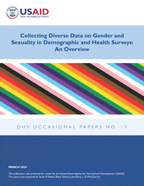There is no printed copy available to order.
Abstract:
The United States Agency for International
Development (USAID) has long been a champion
of gender equality and in recent years have
updated their policies to recognize that sex
disaggregation in a binary does not fully
reflect the populations being served. In
2023, USAID released their first ever LGBTQI+
inclusive development policy which raises
awareness of individuals with diverse sexual
orientation, gender identity, gender
expression, or sex characteristics (SOGIESC)
and commits USAID toward inclusive leadership
in development, expansion of precise data
collection, partnership with local
communities, and inclusive crisis
response. Since 2015, the Sustainable
Development Goals (SGDs) have set ambitious
targets with the aim of leaving no one
behind. To ensure that the SDGs are achieved
by all, the United Nations (UN) has
repeatedly recommended improvements in data
disaggregation by SOGIESC status.
The USAID funded Demographic and Health
Surveys (DHS) Program, begun in 1984, works
closely with various UN agencies, along with
other major funders, to support National
Statistical Offices in the collection of
demographic and health data. Governments then
use these data to set policy, track programs,
and monitor progress towards the SDGs. The
DHS Program has collected diverse SOGIESC
data through household surveys for the past
twenty years.
This paper provides an overview of existing
recommendations and guidance on collecting
SOGIESC data, as well as how SOGIESC data are
standardly collected in DHS surveys, a review
of DHS surveys which have collected more
diverse SOGIESC data, and key considerations
for collecting diverse SOGIESC data in DHS
surveys.
 Collecting Diverse Data on Gender and Sexuality in Demographic and Health Surveys: An Overview (PDF, 3449K)
Collecting Diverse Data on Gender and Sexuality in Demographic and Health Surveys: An Overview (PDF, 3449K)
 Collecting Diverse Data on Gender and Sexuality in Demographic and Health Surveys: An Overview (OP15) – Analysis Brief
Collecting Diverse Data on Gender and Sexuality in Demographic and Health Surveys: An Overview (OP15) – Analysis Brief
